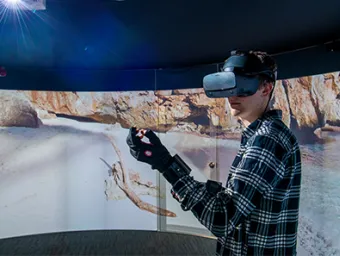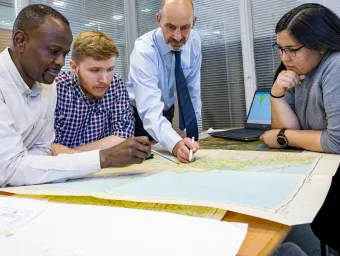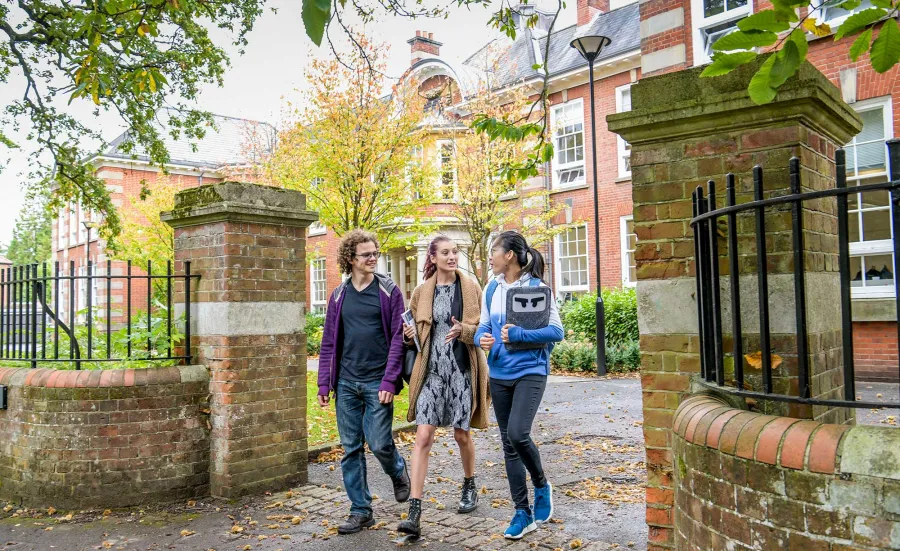Key facts
-
Interdisciplinary teaching and research
Our expertise enables students and researchers to explore their specialisms in new and existing ways supported by Southampton Institute for Arts and Humanities
-
Top 10for research
We have a world-class reputation for research. Most of our departments are ranked top 10 in their fields.
-
Parkes Institute and library
We host a unique centre for the study of Jewish and non-Jewish relations, the Parkes Library, and one of Europe's largest Jewish archives
Overview
About the School of Humanities
We are fascinated by people and their achievements over the centuries, from prehistory to the modern day. We have a world-class reputation for research and teaching. The majority of our departments are ranked in the top 10 in their fields in the Research Excellence Framework (REF) 2021.
Our teaching is regularly recognised as a leader in the annual National Student Survey. We're proud to have a friendly and approachable community that is always willing to help colleagues and students to succeed. According to the 2021 Graduate Outcomes Survey, 100% of undergraduates are employed or in further study within 15 months of graduation.
We also have networks for knowledge exchange, enterprise and lifelong learning. We share best practice and create mechanisms for understanding how we create, recognise and maintain significant and effective partnerships. We work with:
- national and international cultural institutions
- creative practitioners
- cultural or heritage industries
- governmental and policy-making bodies

Research culture and enterprise
We have a vibrant interdisciplinary research culture in the School of Humanities. Staff and students work together on blue skies research driven by curiosity such as:
- investigating literary and visual culture
- heritage
- gender
- the nature of society
Global challenges
Our work also addresses some of the world's greatest challenges, locally, nationally and internationally. We work in relevant areas, for example:
- racism
- migration and refugees
- intercultural relations
- well-being
- climate
International opportunities
We have sustained partnerships with prominent international universities to enhance our research and increase our global reputation.
Interdisciplinary culture
We develop high impact collaborative projects within the University, the sector and the wider community. Working across disciplines is a positive advantage to Humanities research. Humanities researchers can offer a critical voice and cultural perspective as part of an interdisciplinary agenda.
The Southampton Institute for Arts and Humanities enables humanities scholars to participate fully in a rapidly changing research and funding landscape. The Institute promotes the local, national and international significance and visibility of all Humanities research.
Education
We provide an environment in which our students can flourish. We support them as they develop as independent, creative and critical thinkers who can make positive and meaningful contributions to society.
Our curriculum reflects the expertise and passion that our staff and students share for their subject areas. This is embodied by the 8 departments which make up our School.
Interdisciplinary study
At the same time, we embrace interdisciplinary study, demonstrated by the wide range of joint honours programmes we offer. In particular, our BA liberal arts allows students to follow a broad humanities curriculum with 14 specialist pathways from across the humanities and social sciences.
Curriculum
The first year of our undergraduate curriculum is designed to support students in their transition to University study. It provides a solid grounding in their chosen subject areas. In subsequent years, our flexible curriculum allows students to build on this foundation and tailor their studies to their own specialist interests.
Allied to their main subjects, students are able to:
- pursue study abroad opportunities
- gain professional experience through work placements
- undertake a year in employment
The work of our team at the Digital Humanities facilities allows students to explore digital and computational approaches to the study of the humanities. They are able to develop subject specific digital skills and knowledge.

Internationalisation
We are part of a globally engaged university, committed to making a positive social impact and increasing social mobility, transforming lives and enhancing prosperity across the globe.
Our research, teaching and knowledge exchange and enterprise are international in outlook and our alliances and collaborations have a global reach. We aim to facilitate educational experiences that will help Southampton graduates to understand different perspectives and develop the skills that they will need to flourish in the global workplace.
Equality, diversity and inclusion
Our equality, diversity and inclusion (EDI) priorities are three-fold, echoing the University mission statement which is grounded by the triple helix.
Mission statement
Equitable community-building
This relies on the co-creation of the School as an inclusive environment where we feel safe in bringing our whole selves to work and study. Senior academic staff, early career scholars, administrative and other staff and students at all levels are invited to join in this process.
Accessible practices and interactions
This is the commitment to make deliberate decisions in ensuring that nobody is disadvantaged by what we do and how we do it. We seek to engage meaningfully with one another in the spirit of collegiality, reducing barriers to access and success for all.
Transparent processes
We have transparent processes that build a culture of openness and accountability, enabling all to understand the rationale for decisions made through plain communication and meaningful collaboration.
Knowledge exchange and enterprise
Meaningful and targeted knowledge exchange and enterprise (KEE) is fundamental to us. We set the agenda on how universities can be a cultural civic partner. We add real value to our local region and beyond, to enable impactful civic outcomes. We have networks for to share best practice and create mechanisms for understanding how we create, recognise and maintain significant and effective partnerships.
-

Lifelong Learning Unit
Our courses provide a learning experience where people can engage with new ideas, skills and viewpoints, drawing on our latest research and teaching expertise.
-

Southampton Digital Preservation Advisory Unit
The unit provides advice and training for organisations such as galleries, museums, and other industries on how to build their digital archives, what material to select, and how best to preserve it.
Our research community
Interdisciplinary research institutes and centres bring together specialists to share knowledge and solve problems.
-
Digital Humanities
-
The Parkes Institute
-
Southampton Centre for Medical and Health Humanities
-
Southampton Centre for Nineteenth Century Research
-
Southampton Ethics Centre
-
Southampton Institute for Arts and Humanities
-
Centre for Archaeology of Human Origins
-
Centre for Maritime Archaeology
-
Centre for Modern and Contemporary Writing
-
Centre of Medieval and Renaissance Culture
-
Centre for Global Englishes
-
Centre for Transnational Studies
-
Centre for Linguistics, Language Education and Acquisition Research
Work with us
-

Jobs at Southampton
From working with our students to cutting edge of research, find out about career options at the School of Humanities.


